Iran Says Seoul Must Free Blocked Funds Irrespective Of Nuclear Talks

Iran's chief envoy in Vienna nuclear talks says South Korea must release Tehran's frozen funds no matter the outcome of the negotiations to restore the JCPOA.

Iran's chief envoy in Vienna nuclear talks says South Korea must release Tehran's frozen funds no matter the outcome of the negotiations to restore the JCPOA.
According to the official government news website IRNA, Ali Bagheri-Kani made the remarks on Thursday as he met with Korean Vice Foreign Minister Choi Jong-Kun on the sidelines of the official negotiations.
He added that "unilateral US sanctions cannot justify the non-payment of debts to Iran".
The Korean diplomat said in a tweeton Thursday, “We exchanged views on our bilateral relationship including the frozen fund. Korea and Iran will work together and preserve our historically important relationship.”
Washington says it will waive sanctions on South Korea over frozen Iranian assets only with “everything” agreed in Vienna nuclear talks.
Since introducing ‘maximum pressure’ sanctions and leaving the JCPOA in 2018, the US has imposed banking sanctions on Iran. Two South Korea banks hold $7-9 billion of Iranian money, owed for oil imports.
Iran has funds frozen not just in South Korea but in Japan, Iraq, India, and China, mainly for oil and gas deliveries. The semi-official Iranian Students News Agency (ISNA) reported November 13 that Iran's assets frozen abroad totaled $50 billion, with $8 billion in South Korea, $3 billion in Japan, and $6 billion in Iraq.
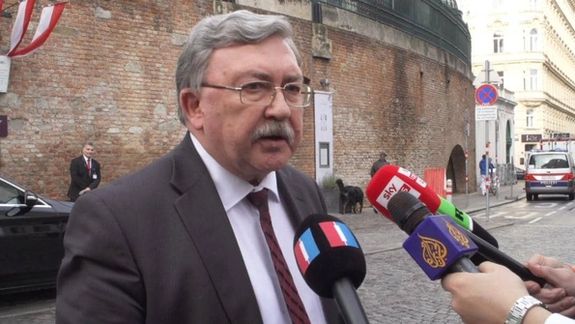
Seeking progress in reviving the 2015 Iran nuclear agreement, a senior South Korean diplomat has met representatives of world powers in Vienna.
As a major past buyer of Iranian oil, Seoul holds around $7 billion in payments owed to Iran for purchases made before the United States imposed sanctions on Tehran’s international banking transactions. Washington began its ‘maximum pressure’ in 2018 as it left the 2015 nuclear deal, the Joint Comprehensive Plan of Action (JCPOA).
The South Korean foreign ministry said Thursday that Choi Jong-kun, first vice foreign minister, had called for “positive progress” with talks at "a critical juncture.” In meetings with – among others – Robert Malley, US special envoy for Iran, and Enrique Mora, the senior European Union official chairing formal talks in Vienna, Choi had “reaffirmed that our government will continue diplomatic efforts for progress…[and] actively play any role that it can possibly play.”
While two Korean banks hold money owed Iran for oil sales before ‘maximum pressure’ kicked in, the resulting stand-off with Tehran has disrupted previously lucrative bilateral trade, with Tehran restricting imports of Korean consumer durables.
Ulyanov tweeting photos
With both US spokesman Ned Price Tuesday and chief Iranian negotiator Ali Bagheri-Kani Wednesday intimating talks were progressing, Russia’s lead negotiator in Vienna Mikhail Ulyanov tweeted Wednesday a photo showing remaining JCPOA participants, without Iran, meeting the US delegation.
As the US left the JCPOA in 2018, formal talks involve remaining signatories – China, France, Germany, Iran, Russia, and the United Kingdom – with Washington taking part only indirectly. Sticking to JCPOA structures and to its insistence that the US as the party leaving the agreement should mend its ways before re-joining, Tehran refuses face-to-face meetings with Washington.
Ulyanov tweeted that the process was moving “slowly but steadily.” The Russian negotiator, who is Moscow’s ambassador to the International Atomic Energy Agency, seems to have taken on a greater liaison role with tensions rising, at least in public, between Iran and the ‘E3’ of France, Germany and the United Kingdom.
“Regular meetings of JCPOA participants (without Iran) and the US after 6pm provide a good opportunity to take stock of the latest developments in the course of the Vienna talks,” Ulyanov tweeted.
The Russian envoy also noted that any deadlines for the talks were fluid, apparently distancing himself from European pronouncements that time is running out due to Iran’s continuing expansion its atomic program under steps began in 2019 beyond JCPOA limits.
‘European spies’
In Washington this week, German Foreign Minister Annalena Baerbock said Tehran had squandered trust and that limited time remained to save the JCPOA. After transatlantic tensions during the administration of Donald Trump (2016-20), Europe has sought a more positive relationship with President Joe Biden.
Baerbock tweeted Wednesday a picture with Antony Biden, US Secretary of State, with a message that there was “no alternative to dialogue” and that the two sides had agreed to “collaborate closely” over Russia, presumably a reference to tensions over Ukraine rather than to the Vienna talks.
The latest Iranian broadside aimed at the Europeans came from Mahmoud Abbaszadeh Meshkini, spokesman of parliament’s National Security and Foreign Policy Commission, in an interview with the official news agency IRNA published Thursday.
Meshkini said that with Vienna talks reaching “the content of the proposals” Iranian negotiators would not be deterred by “European spies” or by talk of deadlines.
Meshkini suggested discussions were continuing on proposals put forward by Iran and by others. The Vienna talks, which began back in April, have struggled to agree which US sanctions breach the JCPOA and exactly how Iran’s nuclear program, expanded and refined since 2019, could be brought back within JCPOA limits.
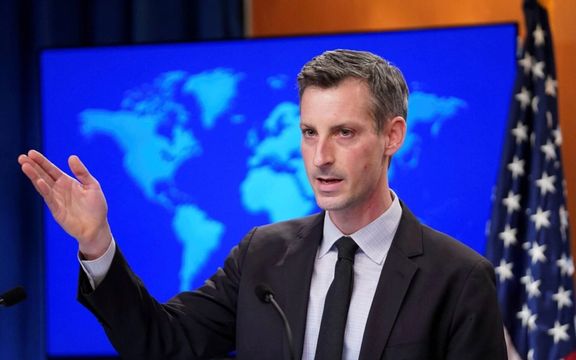
Washington will waive possible sanctions on South Korea over frozen Iranian assets only with “everything” agreed in Vienna nuclear talks, a spokesman has said.
With Choi Jong-kun, South Korea’s first vice-foreign minister, due in Vienna, US State Department Spokesman Ned Price said Tuesday that progress over the Iranian assets depended on the nuclear talks, which aim to revive the 2015 Iran agreement, the JCPOA (Joint Comprehensive Plan of Action).
"Nothing is agreed until everything is agreed when it comes to these issues," Price said. "So I wouldn’t want to get ahead of where we are."
Price said that sanctions relief and the steps that the United States would take together with the nuclear steps that Iran would need to take are at the heart of the Vienna negotiations.
Price said any progress in talks last week was "modest." He reiterated that Washington’s goal was to address the “proliferation threat” of Iran’s nuclear program through “diplomacy and to test the proposition as to whether a mutual return to compliance with the JCPOA remains a possibility."
Since introducing ‘maximum pressure’ sanctions and leaving the JCPOA in 2018, the US has threatened punitive action against any third party buying Iran’s oil or dealing with its financial sector. Two South Korea banks hold $7-9 billion of Iranian money, largely owed for oil imports, despite Iran’s protests. In 2021 Iran detained a Korean tanker and last year banned the import of home appliances made by the two leading Korean manufacturers.
Iran has assets frozen not just in South Korea but in Japan, Iraq, India, and China, largely for money owed for oil shipments. The semi-official Iranian Students News Agency (ISNA) reported November 13 that Iran's assets frozen abroad totaled $50 billion, with $8 billion in South Korea, $3 billion in Japan, and $6 billion in Iraq.
Iranian officials have made repeated claims that funds would be released, from Iraq in March for instance, but have not subsequently confirmed transfers. Iraq owes Iran around $7 billion for gas and electricity.
Some Iraqi power stations are idle due to a fall in Iranian gas supplies. Iraqi electricity ministry spokesman Ahmed Moussa said Tuesdaythat discussions were continuing with Iran's energy ministry to pay debts with deposits in Tehran's credit fund at Trade Bank of Iraq.
Moussa said gas imports from Iran had fallen from 50 million to 8.5 million cubic meters a day, cutting 4,000 megawatts from the national grid. Iraq’s electricity production has remained low due to various problemsincluding low water levels, supplying only around a third of peak winter demand.
"Iran’s accelerating nuclear steps will increasingly diminish the non-proliferation benefits of the JCPOA" if a rapid understanding on mutual return to compliance is not reached, which Price said remains in the national interest of the US. He stressed. "Iran needs to exercise restraint in its nuclear program and pursue negotiations in Vienna seriously… our goal is to address that proliferation threat through diplomacy and to test the proposition as to whether a mutual return to compliance with the JCPOA remains a possibility."
"The clock will run out" but "not on a predetermined date", the US spokesman said.
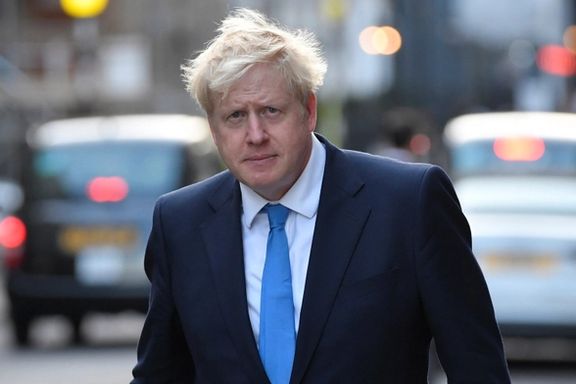
British Prime Minister Boris Johnson warned Iran on Tuesday that time was running out to salvage a 2015 nuclear accord with major powers.
In a call with Israeli Prime Minister Naftali Bennett, Johnson discussed the ongoing talks on the Iran nuclear deal in Vienna.
"The prime minister said the UK wants to see the negotiations in Vienna lead to full restoration of the JCPOA, but that we need Iran to engage in good faith," a Downing Street spokesman said. "The diplomatic door is open, but time is running out to reach an agreement."
European participants in the talks, the UK, France and Germany have been warning Iran that the talks cannot drag on.
Iran interrupted the Vienna negotiations to restore the JCPOA in June for five months and returned to talks in late November. Diplomats say so far, some limited progress has been made but major issues remain to be solved.
In the meantime, Iran continues high-level uranium enrichment, deepening concerns that it might be aiming to build more leverage as it gets closer to building a nuclear bomb.
Talks continue in Vienna with different delegations holding bilateral and multilateral discussions. Iran’s chief negotiator Ali Bagheri-Kani Tuesday met with Russia’s envoy Mikhail Ulyanov, but the contents of the talks have not been disclosed.
With reporting by Reuters
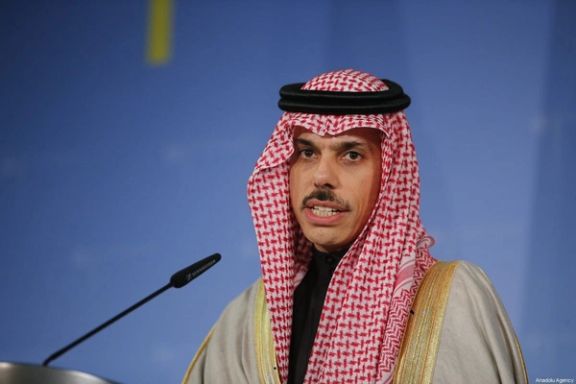
Saudi Arabia’s Foreign Minister Prince Faisal bin Farhan Al Saud has expressed concerns over “transgressions by Iran”, particularly in its nuclear program.
According to al-Arabiya, the visiting Saudi diplomat made the remarks at a joint press conference with Greek Foreign Minister Nikos Dendias in Athens on Tuesday.
Prince Farhan pointed out that Iran's activities don’t match with what Tehran declares about “the peaceful nature” of its nuclear program.
He reiterated Saudi Arabia’s support for international efforts to prevent Iran from acquiring nuclear weapons, as Tehran and world powers are negotiating over the revival of their nuclear agreement in Vienna.
Bin-Farhan said that he explained to his Greek counterpart "the Houthi group's threat to international navigation, the latest example of which was the hijacking of a civilian shipat sea."
The Saudi minister made similar comments after his meeting with his Jordanian counterpart Ayman al-Safadi in Amman on Monday, stressing “the importance of intensifying efforts to prevent Iran from acquiring nuclear weapons and make the Middle East free of weapons of mass destruction.”
Riyadh and Tehran held talks last year to reduce tensions with the aim of restoring diplomatic ties broken since January 2016. So far, the talks have been exploratory with no tangible results.
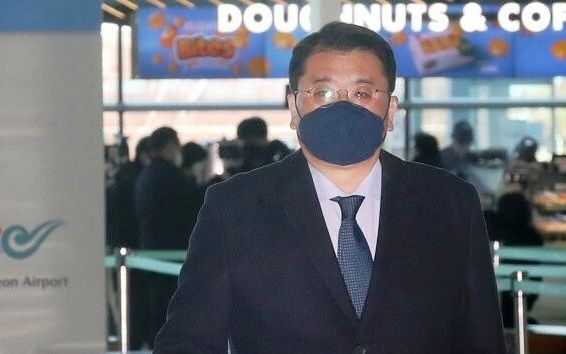
South Korean Vice Foreign Minister Choi Jong-kun has left for Vienna to meet the representatives of Iran and other counties taking part in talks to revive the 2015 nuclear agreement.
According to the Yonhap news agency on Tuesday, the South Korean official will hold meetings with the negotiating parties until Sunday.
South Korea is not directly involved in the talks to revive the 2015 the Joint Comprehensive Plan of Actions (JCPOA), but Seoul has been exchanging views about the Vienna talks because some of Iran’s funds are blocked in its banks because of United States sanctions.
Two South Korean banks hold $7 billion of Iran’s funds from the time when Seoul was purchasing oil from Tehran before full US sanctions on Iran’s crude exports were imposed in May 2019.
In an interview in late December, South Korean ambassador in Tehran Yun Kang-hyeo said US sanctions have harmedhis country’s economy.
Yun told the Iranian Labour News Agency (ILNA) that his country had suffered more than any − other than Iran itself − from ‘maximum pressure,’ under which the US threatens punitive action against anyone buying Iran’s oil or dealing with its financial sector.
US Special Envoy for Iran also held a meeting with the South Korean vice foreign minister in October to discuss cooperation over negotiations to restore the nuclear deal.